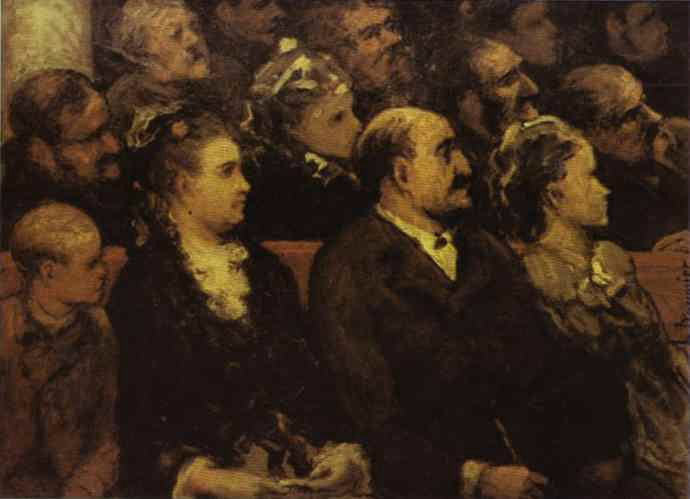Excellence Rejected
by James Delingpole (June 2019)

French Theatre, Honoré Daumier, 1857
Les Miserables—set in 1830s France—the character of Inspector Javert is played by an actor of Nigerian heritage, David Oyelowo?
Read more in New English Review:
• Virtue Gone Mad
• Buddy Bolden, the Blues, and the Jews
• Much More than a Trade War with China
How can we tell the difference between bad art and good art?
Pride and Prejudice</em>; La Grande Belezza</em>; The Sopranos</em>; etc—the answer is always the same.
We know that The Iliad is a masterpiece because it tells us so much that is true about the horror and pity and glory of war.
We know that Led Zeppelin IV is a masterpiece because it rocks, perhaps harder than any other rock album before or since.
mot juste.
Those odd casting decisions I mentioned at the beginning are just a particular manifestation of a much wider phenomenon: the rejection of excellence—or, if you prefer, truth—as the ultimate goal of artistic achievement in favour of a political agenda which, of necessity, involves a diminution in aesthetic quality.
Sûreté Nationale. Vidocq, like the vast majority of the population in France at that time, was white. By the standards of that time it would have been remarkably unusual for a black man to rise to the rank of police inspector. Even assuming it were possible, it would surely have been the subject of endless comment. So I think we can probably rule out that theory.
policy on “diversity and inclusion.” In keeping with its statement that “we are challenging ourselves to ensure that Diversity and Inclusion is hardwired into everything the BBC does,” the BBC now operates a casting quota system, with ever more stringent targets to be attained by 2020. By that year, its goal is to have women occupying 50 percent of all lead roles on screen; “disability” to be featured in 8 percent of roles (some of them lead); black, Asian and ethnic minorities to be “on screen, on air and in lead roles” 15 percent of the time; and LGBT actors to be on screen and in some lead roles 8 percent of the time.
The Bodyguard (which you can now see on Netflix). It wasn’t my cup of tea, particularly, but you can see why it was popular: Keeley Hawes played a UK Home Secretary who had a naughty fling with her hunky bodyguard, the relationship spiraling into chaos involving terrorist bombs and all manner of complicated conspiracies involving the secret services. What really put me off, though, was the United Colours of Benetton approach to casting: the police snipers were black and female, the head of the SWAT team was of Indian or Pakistani heritage, the bomb disposal expert was of oriental extraction—none of which they would be, even now, in early 21st century Britain. Despite copious efforts by the police to recruit more widely, all the above roles are still performed overwhelmingly by white men. Now you might find that fact problematic but it’s a fact all the same. So what the casting is doing by pretending otherwise is subtly—or not so subtly—detracting from the plausibility of the drama. God knows, Jed Mercurio thrillers are convoluted enough. The last thing you need when you’re trying to follow his threads and guess who really is behind the evil masterplan is to find yourself going: “Another powerful woman/black or Asian person/disabled person doing a job they’d be unlikely to have in real life. Really? Can’t the BBC just trust me not to be sexist and racist without turning even its potboiler dramas into homilies on the vital importance of diversity??”
Daily Mail (his employer at the time) to run it—as the inevitable reaction from the progressive Establishment demonstrated.
Daily Mail to argue his case he barely even tried to defend the actor’s casting on artistic grounds. Instead he accused Letts of being an “old dinosaur raising his head from the primordial swamp and blinking in disbelief that the world is no longer as he expected it to be.”
Read more in New English Review:
• Random Thoughts on Randall Jarrell
• The Strains of a Nation
• The Hamlet Castle
The Highwaymen, about the Texas Rangers who tracked down Bonnie and Clyde. In the Netflix version, the Rangers were played by white actors Kevin Costner and Woody Harrelson. Had the BBC made this film, I dread to think what casting decisions might have been foisted on it in the name of those BAME quota targets . . .
«Previous Article Home Page Next Article»
__________________________________
James Delingpole is an writer, journalist, and columnist who has written for a number of publications, including the Daily Mail, Daily Express, The Times, The Daily Telegraph, and Spectator. He is executive editor for Breitbart London. He has published several novels and political books and is an incredibly groovy guy.
Follow NER on Twitter @NERIconoclast